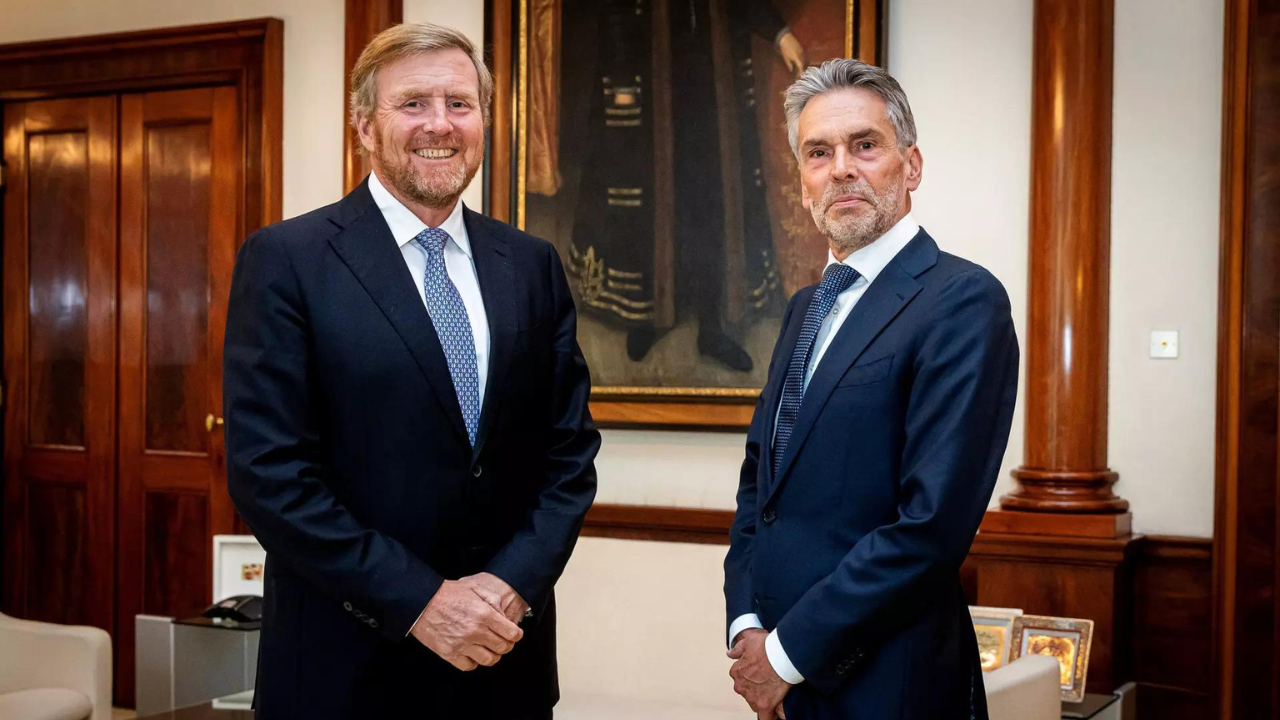After more than seven months since the elections, which saw the far-right party gain significant ground, a new government has taken office in the Netherlands. The newly appointed Prime Minister, Dick Schoof, along with 15 other ministers, were sworn in by Dutch King Willem-Alexander on Tuesday.
Dick Schoof, a former head of Dutch intelligence with no party affiliation and not on the ballot in the November election, is replacing Mark Rutte as prime minister.
The formation of this right-leaning coalition government brings to a close the 14-year tenure of the previous Prime Minister, Mark Rutte. The swearing-in ceremony marked the official transition of power and the beginning of a new political era for the country.
Geert Wilders’ Party for Freedom, which secured the most seats in last year’s elections, led the coalition negotiations that lasted 223 days. Although Wilders did not become prime minister due to opposition from his partners, his party’s influence is clear in the new government’s policies. The coalition includes Rutte’s center-right People’s Party for Freedom and Democracy, the populist Farmer Citizen Movement, and the centrist New Social Contract party.
The coalition’s agreement, titled “Hope, courage and pride,” introduces strict measures on asylum-seekers, eliminates family reunification for refugees, and aims to reduce the number of foreign students in the Netherlands. These measures have already faced criticism from within the coalition and from opposition groups.
Despite Wilders’ previous pro-Russia statements, new defense minister Ruben Brekelmans and the new government said that it remains committed to supporting Ukraine. Schoof also said that “The greatest threat is from the east. And I might be more worried about it than most.”
Political youth organizations are already challenging the new government’s immigration policies with youth groups from six parties, including two coalition partners, calling for a softer approach to asylum plans. Eva Brandemann, chairperson of the New Social Contract’s youth wing also said, “Although the influx must be limited, it is of great importance that we receive people here fairly and with dignity”.
The coalition agreement also proposes nearly 1 billion euros in cuts to the country’s education budget, prompting resistance from universities. Nivja de Jong, a professor at Leiden University, stated that the cuts would prohibit students from receiving the quality of education they deserve. She along with other academics are organizing talks to highlight the importance of their work in response to the proposed budget cuts.
The new government will spend the summer finalizing its coalition agreement into a comprehensive governing plan.
Dick Schoof, a former head of Dutch intelligence with no party affiliation and not on the ballot in the November election, is replacing Mark Rutte as prime minister.
The formation of this right-leaning coalition government brings to a close the 14-year tenure of the previous Prime Minister, Mark Rutte. The swearing-in ceremony marked the official transition of power and the beginning of a new political era for the country.
Geert Wilders’ Party for Freedom, which secured the most seats in last year’s elections, led the coalition negotiations that lasted 223 days. Although Wilders did not become prime minister due to opposition from his partners, his party’s influence is clear in the new government’s policies. The coalition includes Rutte’s center-right People’s Party for Freedom and Democracy, the populist Farmer Citizen Movement, and the centrist New Social Contract party.
The coalition’s agreement, titled “Hope, courage and pride,” introduces strict measures on asylum-seekers, eliminates family reunification for refugees, and aims to reduce the number of foreign students in the Netherlands. These measures have already faced criticism from within the coalition and from opposition groups.
Despite Wilders’ previous pro-Russia statements, new defense minister Ruben Brekelmans and the new government said that it remains committed to supporting Ukraine. Schoof also said that “The greatest threat is from the east. And I might be more worried about it than most.”
Political youth organizations are already challenging the new government’s immigration policies with youth groups from six parties, including two coalition partners, calling for a softer approach to asylum plans. Eva Brandemann, chairperson of the New Social Contract’s youth wing also said, “Although the influx must be limited, it is of great importance that we receive people here fairly and with dignity”.
The coalition agreement also proposes nearly 1 billion euros in cuts to the country’s education budget, prompting resistance from universities. Nivja de Jong, a professor at Leiden University, stated that the cuts would prohibit students from receiving the quality of education they deserve. She along with other academics are organizing talks to highlight the importance of their work in response to the proposed budget cuts.
The new government will spend the summer finalizing its coalition agreement into a comprehensive governing plan.






